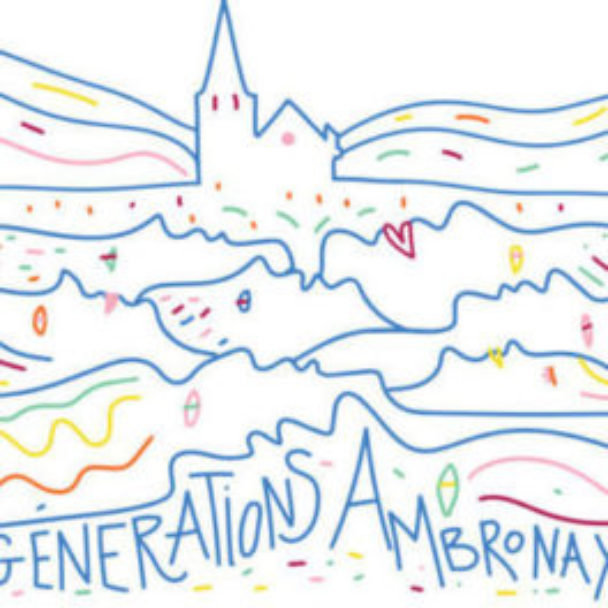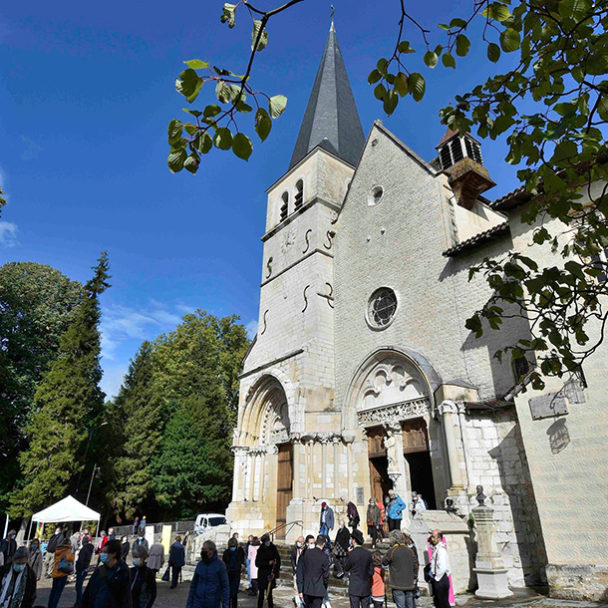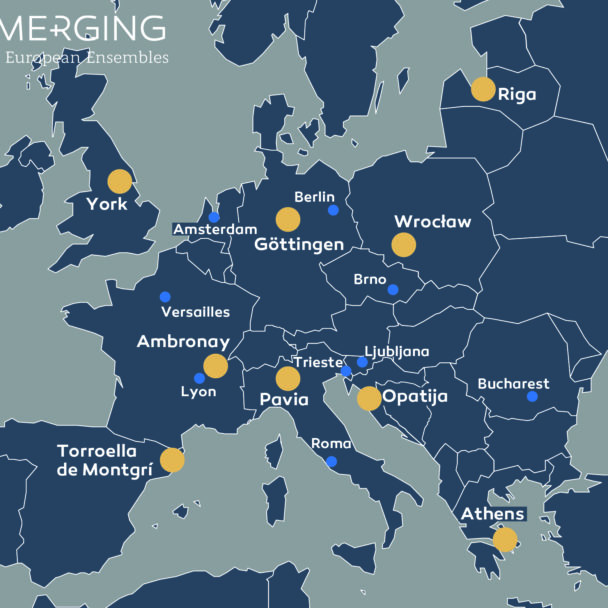The S-EEE programme will contribute to strengthening the ensembles and their artistic projects, while providing them entrepreneurial and sustainability skills to develop a career in the international market with sustainability in mind. S-EEE understands sustainability in all its plural dimensions – social, economical, cultural as well as ecological
About Sustainable-EEEMERGING
Launched in 2014, EEEMERGING was born out of a twofold understanding: firstly, Early Music embraces a European dimension in repertory, education and performance and therefore needs to be promoted cooperatively at the European level. Secondly, small ensembles, both attractive to concert programmers and agile in terms of repertory, are the ideal vehicles for transmitting this music that remains rooted in our contemporary, ever-evolving, world.
Taking into account the achievements of the EEEMERGING and EEEMERGING+ programmes, Sustainable-EEEMERGING (2024-2027) moves forward to keep pace with the changing environment, making sustainability one of the core values of the project, while aiming to have an impact on the Early Music ecosystem. For instance, the project will take action to ensure the soundness of professional careers for artists with an historically informed approach, but also to increase the opportunities for the dissemination and reception of Early Music repertoires across Europe by adopting more sustainable practices from an environmental, economic and social point of view.
The project will be carried out through a series of actions defined and implemented by a consortium of 13 organisations and a circle of over 20 partners (promoters, networks, alumni), in cooperation with a community of musicians who have been supported by the programme over the last 10 years.
The S-EEE consortium is made up of Ambronay Centre culturel de rencontre and its Festival (France), Internationale Händel-Festspiele Göttingen (Germany), Helsinki Baroque Orchestra (Finland), Athens Conservatoire (Greece), Udruga Festival Kvarner (Croatia), Ghislierimusica (Italy), Riga Senas Muzikas Centrs (Latvia), Joventuts Musicals de Torroella de Montgrí – Festival de Torroella de Montgrí (Spain), Academia de Musica de Espinho (Portugal), Pro Progressione (Hungary), The Green Room (France), All’Improvviso festival (Poland), Concentus Moraviae festival (Czech Republic).
To learn more about about the past four years of EEEMERGING, check out our brochure:

S-EEE is supported by the Creative Europe programme of the European Union.

The S-EEE young ensembles support programme
In implementing this project, all partners have a keen focus on sustainability, of course, but also on diversity in terms of repertoire, social and gender equity, geographical balance, for example. While artistic quality is paramount, imagination, experimentation and attention to a plurality of audiences, outreach projects or sustainability issues, matter.
Following their audition and interview, the selected Ensembles will benefit from a tailor-made Learning programme adapted to each of them. It will be based on the skills necessary to embrace a more sustainable career for musicians, including entrepreneurial skills, care for mental and physical health, definition of an artistic identity and promotion etc…. This will be worked out in relation with the sustainability issues specific to musicians and ensembles (e.g. limiting ecological impacts, working conditions…).
During the two years, the following will be carried out:
- Online collective learning sessions on entrepreneurship and sustainability issues (around fifteen sessions).
- A minimum of three Learning residencies (6 days each) offering time for research and creation at partner sites, including specific training, tutoring on practical issues by the host team, and possibly outreach activities or paid concerts as practical applications. Expenses related to residencies will be covered.
- A grant to support the development of professional promotional tools.
- Mentorship from a representative of a partner organisation to address the ensemble’s professional goals.
- Integration into the EEE community, where they can interact with other artists and partner organisations, benefit from first-hand experience of alumni ensembles, and have the opportunity to respond to exclusive calls for projects (residency labs, cd recordings, sustainable tours,…).
Selection criteria
We are looking for emerging ensembles based on Historically Informed Performance music practices with:
- good musical qualities,
- at least a first reflection on their artistic vision and drive,
- a great interest in musical sources and a capacity to embrace innovation,
- a taste for the originality of repertoires,
- a willingness to develop their marketing skills.
Please note that if S-EEE will support ensembles in the Early Music field understood as an historical European musical art form spanning over 1000 years and “rediscovered” in the 1950’s onwards, we are however open to other historically informed music proposals.
We are looking for emerging ensembles with considerations for sustainability issues: we are very interested in your own environmental, social and economical views and practices. This may be envisaged in different forms : through a special awareness or action on the limitation of your ecological impacts, an attention to diversity and equity, a choice of music repertory or theme related to the topic, an experience in outreach activities, a way to embrace social and economic sustainability of the ensemble, a new approach in touring, programming…
Eligibility criteria
- The application must be submitted by already existing ensembles with at least one public concert, and with the first concert given after the 1st January 2019. An ensemble is understood as composed of 2 to 9 musicians who play together on a regular basis.
- Members of the ensemble must have an average age of 32 or less (maximum individual age is 36 years old)
- The ensemble must be based in a EU member state, a Creative Europe country or another included country – the United Kingdom, Switzerland (full list below).
- Ensembles that have already been supported by the EEEMERGING or EEEMERGING+ programme are not eligible.
How to apply (applications are closed since February 11th)
Application follows a two-steps procedure, with an initial online application and an audition for the pre-selected ensemble.
First step: online application
- You should fill-in the application form in English (see below), which will be examined by project partners.
Second step: audition for about 20 pre-selected ensembles
- If you are pre-selected, we will ask you for additional information.
- We will also give more details on the training program that will be provided
- If pre-selected, the full cast of the ensemble must be available for an eventual audition (see dates and cities below) by a jury composed of project partners. The ensemble should cover its own travel and accommodation costs. Some instruments will be at the disposal of the ensembles for the auditions (harpsichords, organs…): the list will be confirmed in due time.
Schedule
- Publication of the call : 22 December 2023
- Submission of your application : 11 February 2024 before midnight
- Notification of preselection : 19-22 February
- Notification of the selection by mid-April 2024
We had an Online Information Session, if you have questions, you might find answers there! To watch it, go on this link with the code 27U7@o!d.
Application tips
- For videos and audio: upload them online and send us a link (with a secret code if necessary). We recommend using video (Youtube, Dailymotion, Vimeo, Peertube…) or audio (SoundCloud) platforms, or uploading your audio-video files on a drive without restricted access (GoogleDrive, DropBox, NextCloud…).
- The video and audio may be a fairly simple recording of a performance (live or in the studio), but of good quality. We prefer raw videos that reflect the personality of the ensemble rather than a sophisticated promotional video.
- We won’t be able to provide individual feedback on your application, before or after the selection.
- Some resources on sustainability: “Cultural commitment for environmental action” by Chiara Baldi, Cultural Adaptation website.
Eligible countries
- EU member states: Austria, Belgium, Bulgaria, Croatia, Cyprus, Czech Republic, Denmark, Estonia, Finland, France, Germany, Greece, Hungary, Ireland, Italy, Latvia, Lithuania, Luxembourg, Malta, Netherlands, Poland, Portugal, Romania, Spain, Slovakia, Slovenia, Sweden.
- Creative Europe countries: Albania, Armenia, Bosnia and Herzegovina, Georgia, Iceland, Kosovo, Liechtenstein, Moldova, Montenegro, North Macedonia, Norway, Serbia, Ukraine, Tunisia.
- Other included countries: Switzerland and the United Kingdom.


